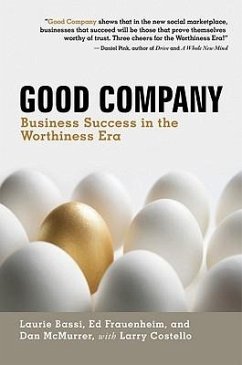Companies shirk taxes while padding profits.
Firms foul the planet but keep raking in revenue.
Reckless greed on Wall Street goes largely unpunished.
More evidence that bad guys finish first in business?
No. A different story is unfolding.
Laurie Bassi and her coauthors show that despite the dispiriting headlines, we are entering a more hopeful economic age.
The authors call it the Worthiness Era. And in it, the good guys are poised to win.
Good Company explains how this new era results from a convergence of forces, ranging from the explosion of online information sharing to the emergence of the ethical consumer and the arrival of civic-minded Millennials. Across the globe, people are choosing the companies in their lives in the same way they choose the guests they invite into their homes. They are demanding that companies be good company.
Proof is in the numbers. The authors created the Good Company Index to take a systematic look at Fortune 100 companies records as employers, sellers, and stewards of society and the planet. The results were clear: worthiness pays off. Companies in the same industry with higher scores on the index that is, companies that have behaved better outperformed their peers in the stock market. And this is not some academic exercise: the authors have used principles of the index at their own investment firm to deliver market-beating results.
Using a host of real-world examples, Bassi and company explain each aspect of corporate worthiness and describe how you can assess other companies with which you do business as a consumer, investor, or employee. This detailed guide will help you determine who the good guys are those companies that are worthy of your time, your loyalty, and your money.
Firms foul the planet but keep raking in revenue.
Reckless greed on Wall Street goes largely unpunished.
More evidence that bad guys finish first in business?
No. A different story is unfolding.
Laurie Bassi and her coauthors show that despite the dispiriting headlines, we are entering a more hopeful economic age.
The authors call it the Worthiness Era. And in it, the good guys are poised to win.
Good Company explains how this new era results from a convergence of forces, ranging from the explosion of online information sharing to the emergence of the ethical consumer and the arrival of civic-minded Millennials. Across the globe, people are choosing the companies in their lives in the same way they choose the guests they invite into their homes. They are demanding that companies be good company.
Proof is in the numbers. The authors created the Good Company Index to take a systematic look at Fortune 100 companies records as employers, sellers, and stewards of society and the planet. The results were clear: worthiness pays off. Companies in the same industry with higher scores on the index that is, companies that have behaved better outperformed their peers in the stock market. And this is not some academic exercise: the authors have used principles of the index at their own investment firm to deliver market-beating results.
Using a host of real-world examples, Bassi and company explain each aspect of corporate worthiness and describe how you can assess other companies with which you do business as a consumer, investor, or employee. This detailed guide will help you determine who the good guys are those companies that are worthy of your time, your loyalty, and your money.
Close your eyes and wish that companies that were good to their employees, their customers, their communities, and the environment made more money than the bad guys. Now open your eyes and read this fascinating book. Amazingly, Bassi, Frauenheim, McMurrer, and Costello marshal evidence that it s true. Read it and smile.
Dr. Alan Blinder, Gordon S. Rentschler Memorial Professor of Economics and Public Affairs, Princeton University, and former Vice Chairman, Board of Governors of the Federal Reserve System
Good Company sounds an urgent warning: the old ways of treating customers, employees, and communities are no longer good enough. Companies that deliver happiness to all their stakeholders are the ones that will ultimately thrive.
Tony Hsieh, CEO, Zappos.com, Inc., and New York Times bestselling author of Delivering Happiness
Fascinating and insightful! Good Company persuasively makes the case that those employers that build cultures that value anddevelop their people will be more successful than their competitors. The authors go much deeper than the traditional HR focus on employee engagement, unveiling a compelling Good Company Index that grades Fortune 100 companies based on whether they re doing the right things for employees, customers, and the environment.
Sue Meisinger, CEO, Society for Human Resource Management (retired)
Dr. Alan Blinder, Gordon S. Rentschler Memorial Professor of Economics and Public Affairs, Princeton University, and former Vice Chairman, Board of Governors of the Federal Reserve System
Good Company sounds an urgent warning: the old ways of treating customers, employees, and communities are no longer good enough. Companies that deliver happiness to all their stakeholders are the ones that will ultimately thrive.
Tony Hsieh, CEO, Zappos.com, Inc., and New York Times bestselling author of Delivering Happiness
Fascinating and insightful! Good Company persuasively makes the case that those employers that build cultures that value anddevelop their people will be more successful than their competitors. The authors go much deeper than the traditional HR focus on employee engagement, unveiling a compelling Good Company Index that grades Fortune 100 companies based on whether they re doing the right things for employees, customers, and the environment.
Sue Meisinger, CEO, Society for Human Resource Management (retired)




